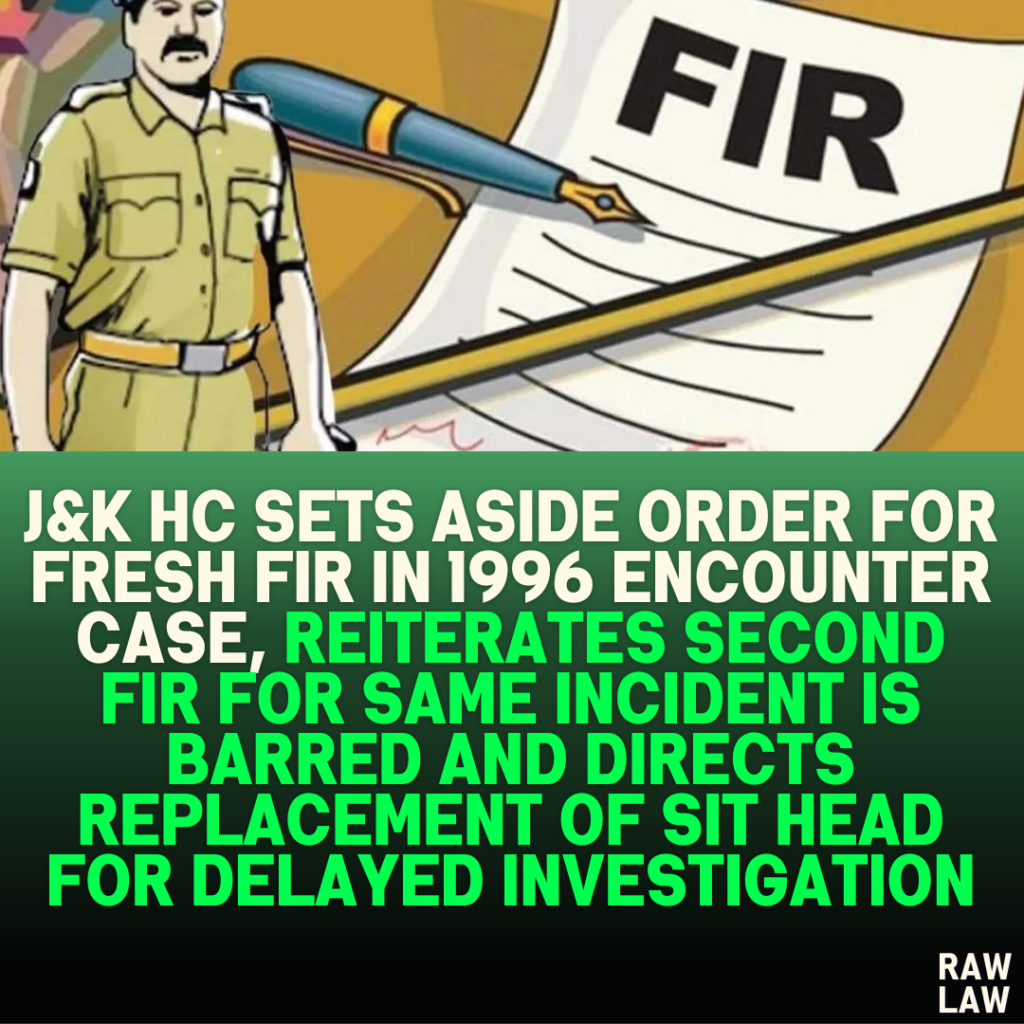Court’s Decision:
The Jammu & Kashmir High Court set aside the Magistrate’s direction for registering a fresh FIR and ordered the replacement of the SIT head due to the delay in investigating the version of the incident provided by the protest petitioner. The court directed the Special Investigation Team (SIT) to complete the investigation under Section 202 of the J&K Criminal Procedure Code (Cr.P.C.) within two months and provide regular reports.
Facts:
The case revolves around an encounter that occurred on May 31, 1996, at Miskeenbagh, Khanyar, during which police reported that two terrorists were killed. FIR No. 88/1996 was registered against the alleged terrorists, including Mohammad Ramzan Bhat. However, the widow of Bhat, Jameela Bano, filed a protest petition in 2021, claiming that her husband was unlawfully detained and beaten to death by the police, who later misrepresented the incident as an encounter. Despite the reopening of the investigation in 2006 by a Special Investigation Team (SIT), the case remained unresolved, prompting her protest petition.
Issues:
- Whether the Magistrate was justified in ordering a fresh FIR despite the existence of FIR No. 88/1996.
- Whether the SIT’s prolonged investigation warrants the replacement of its head.
Petitioner’s Arguments:
The petitioner, the Union Territory of J&K, argued that there was no need for a fresh FIR as FIR No. 88/1996 was already registered and the investigation was ongoing. It was contended that the investigation was transparent and supervised by the Magistrate, rendering the replacement of the SIT head unnecessary. The petitioner also argued that the SIT head was engaged in other official duties and could not appear in person before the Magistrate frequently.
Respondent’s Arguments:
The respondent (the protest petitioner) argued that the police version of the encounter was fabricated, and a fresh FIR was essential to investigate her husband’s alleged custodial killing. She claimed that despite the passage of decades, justice had not been served, and the SIT’s inaction further delayed the process.
Analysis of the Law:
The court analyzed the legal position regarding the filing of a second FIR. It relied on the judgment of the Supreme Court in T.T. Anthony v. State of Kerala (2001) and Upkar Singh v. Ved Prakash (2004), which clarify that while a second FIR concerning the same incident is barred, a counter FIR presenting a different version of the incident is permissible. The court noted that the Magistrate had already taken cognizance of the protest petition as a private complaint under Chapter XVI of the J&K Cr.P.C., making the registration of a fresh FIR legally unsustainable.
Precedent Analysis:
The court referred to the precedents set by the Supreme Court in T.T. Anthony and Upkar Singh to distinguish between multiple FIRs concerning the same incident and a counter FIR for a different version of the event. The court also cited the Division Bench ruling in Sunil Kumar Rai v. UT of J&K (2020) to emphasize the applicability of the J&K Cr.P.C. for incidents preceding the implementation of the Central Cr.P.C. in the Union Territory.
Court’s Reasoning:
The court reasoned that while a fresh FIR was not required, the protest petition had been appropriately treated as a private complaint. Thus, the Magistrate had already initiated proceedings under Section 202 of the J&K Cr.P.C., requiring the investigation of the respondent’s version of events. The court found that the Magistrate erred in later directing the registration of a fresh FIR, as the legal procedure under Section 156(3) Cr.P.C. was not applicable once the complaint process had commenced.
Conclusion:
The court set aside the order directing the registration of a fresh FIR but upheld the Magistrate’s direction to replace the head of the SIT with an officer of impeccable integrity. The investigation was ordered to proceed expeditiously, and periodical updates were to be submitted to the Magistrate.
Implications:
The decision underscores the judicial safeguards against multiple FIRs for the same incident while affirming the legal permissibility of counter complaints. It also highlights the court’s oversight in ensuring prompt and effective investigations, especially in cases involving allegations of police brutality or misconduct.




Pingback: "Bombay High Court Quashes Charges Against Petitioner: No Justification to Continue Criminal Proceedings After Co-Accused's Discharge and Settlement Between Parties" - Raw Law